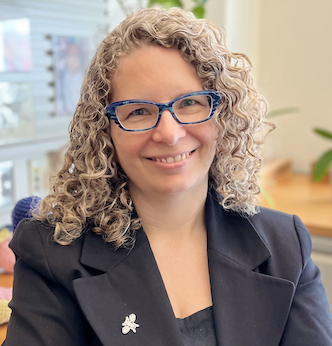
Brown’s Office of the Vice President of Research (OVPR) has selected associate professor of neuroscience and Carney professor Karla Kaun as a recipient of a Richard B. Salomon Faculty Research Award. Designed to recognize excellence in scholarship, the Salomon Awards fund exceptional faculty research projects.
Kaun, a molecular biologist, normally studies the science of addiction using Drosophila, the fruit fly, which shares as many as 75% of disease-associated genes with humans, yet has a comparatively simple biology. The fruit fly’s compact genome and tiny brain allows Kaun and her lab to more easily study how the Notch gene, which governs long-term memory formation, is impacted by alcohol. Thanks to the Salomon Award, she’ll be taking her research out of the lab and into the field. Kaun plans to spend five months in Vancouver, Canada, where all drugs have recently been decriminalized. There, she will collaborate with local public health researchers, bringing her research on fruit flies together with their data on humans.
Unlike others in the addiction field, Kaun’s molecular biology background gives her the expertise to refute the popular idea that, “Addiction is in my genes, so there’s nothing I can do about it.” Kaun explains that our behavior and our environment actually play a crucial role in which of our genes are expressed, when they are expressed and how they are expressed.
“We are a product of both our genes and our environment. We respond to the same environment differently because of our genes, and different environments can influence how our gene expression changes in the brain. It’s a constant loop. So, with changes to our environment, it’s possible for us to change, not our genes, but which genes are turned on at all. Those genes can influence your circuits, and your circuits can influence your cravings and your cravings can influence your recovery from use disorders.”
Vancouver and the public health researchers will provide Kaun with a wealth of data about the sociological, medical, and environmental changes caused by drug decriminalization. Unlike Portland, Oregon, where drugs have also been recently decriminalized, Vancouver’s new policy is underpinned by many years’ worth of social systems supporting use disorders. In other words, the Vancouver data on use disorders and their interaction with supportive environments is incredibly rich and dense.
Kaun credits Carney for helping her bring her research to this exciting stage: “Carney has helped me connect with researchers in the Center for Alcohol and Addiction Studies at Brown. This has really influenced how I see my work, and how it can inform treatments for use disorders.”
She notes how difficult it can be to create links and break down barriers across research disciplines, and expresses gratitude to OVPR for recognizing and facilitating this. “The Saloman award is providing me the funds to have this space to think much more deeply about the broader implications of my work, and how the highly molecular stuff that I do in my lab can apply to actual public health solutions in the context of addiction. Being able to put those three things together is very, very challenging, so the fact that Brown is supporting my efforts is extremely meaningful.”